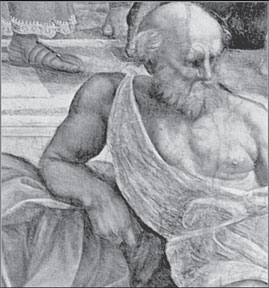A philosopher nicknamed ‘the dog’
 We have such a high regard for philosophers in the East and West that
we hardly make a disparaging remark about them. Almost all the
philosophers are eccentric, away from the centre. You find only ordinary
people who cannot think for themselves at the centre of society. With
all the vicissitudes in life, a few people have been elevated to the
status of philosophers. We admire and virtually venerate them as they
have shown us the right way to live. We have such a high regard for philosophers in the East and West that
we hardly make a disparaging remark about them. Almost all the
philosophers are eccentric, away from the centre. You find only ordinary
people who cannot think for themselves at the centre of society. With
all the vicissitudes in life, a few people have been elevated to the
status of philosophers. We admire and virtually venerate them as they
have shown us the right way to live.
Diogenes of Sinope (400 - 325 BC) was an itinerant philosopher who
eschewed the comforts of civic life in favour of what he called
“self-sufficiency.” The term as we understand today does not connote any
derogatory meaning. In fact, it is a virtue to achieve self-sufficiency
in food, clothes and whatever we need for living. However, Diogenes went
beyond the ordinary meaning of “self-sufficiency” and interpreted it in
a different way.
Diogenes was a contemporary of the celebrated Greek philosopher
Aristotle who lived in Greece from 384 to 322 BC. Diogenes was a
charismatic and an enigmatic philosopher who inspired the Cynics, a
school of thought that rejected complications and machinations of civic
life.
Evidence
There is no historical evidence to show that Diogenes put down his
philosophy in writing. Even if he did so, all that appeared to be lost.
On the other hand, we can surmise that he never did any writing as far
as his philosophy was concerned because he was out of step with modern
ideas.
 |
|
Diogenes: Mastery of the self leads to
happiness and freedom |
Diogenes’ ideal was a simplistic lifestyle. He did not like the
commitments, trappings and distractions of civic life. He wanted
everybody to master their self. While other philosophers professed high
ideals beyond the comprehension of ordinary people, Diogenes dismissed
metaphysics and intellectual humbug of the so-called free thinkers.
Although there may be different ways to achieve happiness, he claimed
that it could only be gained by living “according to nature.” What he
meant was that human beings should satisfy their needs of the body
through the simplest means possible.
Diogenes practised what he preached. He followed a vagrant lifestyle
and soon earned the nickname “the dog.” Plato, another leading Greek
philosopher referred to Diogenes as “a Socrates gone mad.” Unperturbed
by such caustic remarks, Diogenes lived by begging for his basic
requirements such as food and clothes. He was satisfied with what others
gave him and never demanded anything more.
Happiness
According to him, “self-sufficiency” or “mastery of the self” led to
happiness and freedom. But he warned that to achieve self-sufficiency,
you have to train yourself in the face of adversity.
Sometimes, his philosophy came close to Buddhism. The Buddha asked
his followers to give up everything to achieve eternal happiness or
Nibbana. Diogenes too wanted people to abandon their property, loved
ones and family ties. By doing so, he said, they could minimise the
distractions of emotional attachments.
Quite contrary to Buddhism, Diogenes wanted the people to attack
society to liberate others. He wanted everybody to open themselves for
ridicule to remain emotionally detached. On the other hand, his
philosophy appears to be more radical and uncompromising than Buddhism
and Taoism that flourished in the East.
Generosity
A criticism levelled against Diogenes was that he depended on the
generosity of others to lead a vagrant lifestyle. From a practical
standpoint, if everybody followed his lifestyle, society would collapse
and Diogenes himself would not survive. So, most philosophers dismiss
Diogenes’ philosophy being elitist and having no universal appeal.
The Cynics who followed Diogenes were not perturbed by such
criticism. Cynicism flourished in ancient Greece and Rome around 1 AD.
Cynicism had a different meaning from the modern context. Today it comes
very close to asceticism. Therefore, we should not totally dismiss
Diogenes’ philosophy or Cynicism.
Their ideas still remain valid as giving up everything is the
cornerstone of real happiness. If we keep on amassing wealth and
fattening our bank balances, we will never enjoy happiness. To that
extent, Diogenes’ philosophy remains valid even in the Digital Age. |


